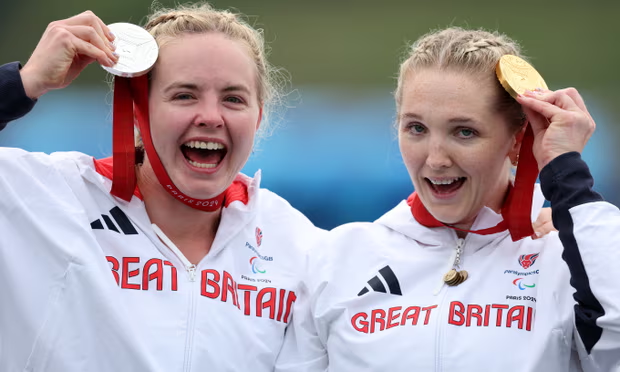The canoeists had been patiently waiting for a long time, only getting into action in Paris after many other sports had already wrapped up and people enjoyed sightseeing or relaxing. But all that waiting worked out for the British team. They finished the second-to-last day of the Games with an impressive haul of gold and silver medals at the Stade Nautique de Vaires-sur-Marne.
It felt like the last day of school, with people lining up for photos next to the giant Phryge, the Games’ mascot, and the torch, as they realized everything was ending. Later, the waving Phryge drifted down the calm waters on a barge, with a five-piece band playing and the crowd cheering excitedly.
On a day that felt like a drizzly day in Dorking, cheerful volunteers in transparent plastic raincoats worked hard. Charlotte Henshaw and Hope Gordon took the top two spots in the VL3 sprint, a new event for these Games in the Va’a boat. Henshaw, a seasoned athlete with five Games and a former swimmer, added another gold to her tally, having already won in Tokyo. She took the lead early and held onto it throughout the race.
After retiring from swimming, Henshaw was keen for a new challenge. She took up canoeing, spurred on by a joke from her teammates: “We only acknowledge one six in the day, and it’s not 6am.” What started as a new adventure quickly turned into a quest for medals.
“At first, I thought it would just be about learning a new skill,” she said. “But soon, my athlete mindset kicked in. I found it challenging to have the mindset of an elite athlete without the same abilities, so adjusting was tough. However, the progress was swift, and I was supported throughout the journey.”
Silver medallist Gordon relocated from the Scottish Highlands to Nottingham for training, where the only person she was familiar with was “Char.”
“She’s been a key part of my journey,” Gordon said, pointing to her friend with the gold medal beside her. “She’s an incredible athlete, but an even better friend. I’m thrilled to share the podium with her. We both wanted those top two spots, no matter what happened today, and I’m so happy we achieved it.”
In the VL2 sprint, defending champion Emma Wiggs clinched another gold, outpacing the younger competitors to earn her fourth Paralympic medal at 44 years old—remarkably, her race number, which she had feared might be a “bad omen.” After a tough few years since Tokyo, including the end of her coaching relationship and a shoulder injury, she was thrilled to “put one in the bag for the team.”
“I spent a lot of time visualizing the crowds and stands,” she said. “Today, when I looked up and saw all those red T-shirts, I knew they were my supporters. I felt a boost of energy from the crowd with every stroke. I wanted to give my best for them, especially in the last 100 meters, and as I went past, I mentally checked off family members one by one.”
There was disappointment for Jeanette Chippington, often called “the queen of para-canoe,” a teammate and friend. Meanwhile, Dave Phillipson won a silver medal in the men’s KL2.
Brahim Guendouz made history by winning the first-ever African medal in para-canoe, taking gold in the KL3 200m final. In a close race, Britain’s Rob Oliver finished sixth. On Sunday, GB athletes can secure five more medals, including Jack Eyers, a former Mr. England who chose the life jacket and paddle over competing in Mr. World.
- Charlotte Henshaw leads British one-two in VL3 sprint
- Emma Wiggs wins fourth Paralympic medal in VL2 sprint
For Further Details, Stay Tuned With Us!
